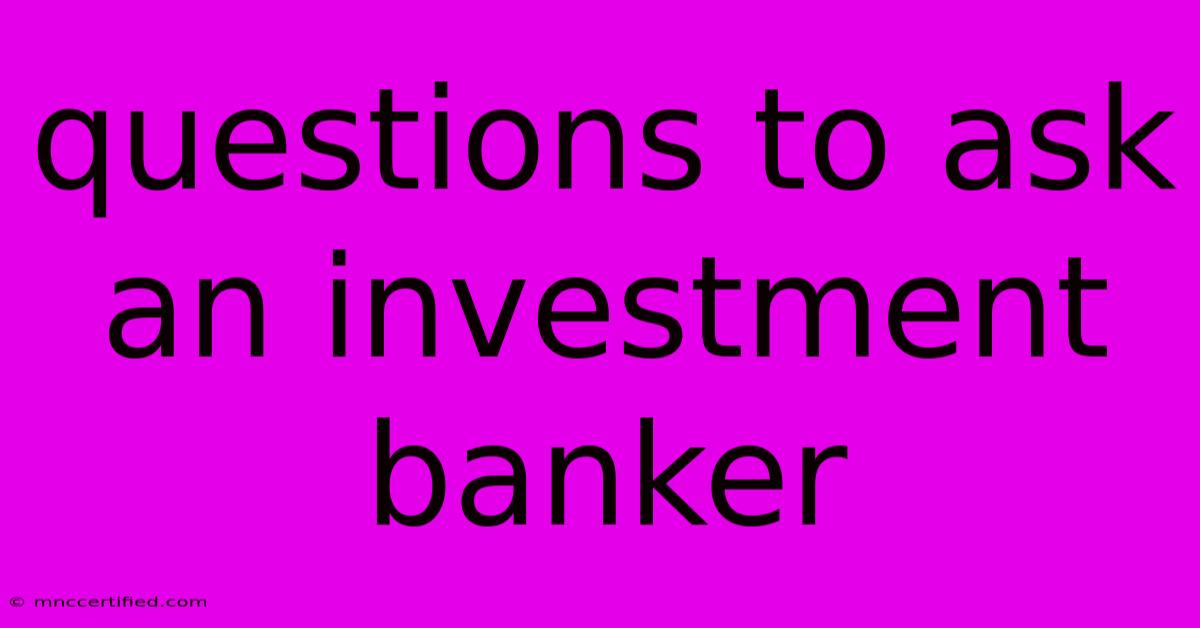Questions To Ask An Investment Banker

Table of Contents
Demystifying the Investment Banker: Questions to Ask Before You Commit
Landing a job in investment banking can be a dream come true for many aspiring finance professionals. It's a fast-paced, intellectually stimulating career path offering high earning potential and prestige. But before you jump in, it's crucial to understand what the role really entails. Asking the right questions during interviews and networking events can help you make an informed decision about whether investment banking is the right fit for you.
What are Investment Bankers Really Like?
Investment bankers work with companies and governments on a wide range of financial transactions, including:
- Mergers and Acquisitions (M&A): Advising companies on buying, selling, or merging with other businesses.
- Equity and Debt Financing: Helping companies raise capital through issuing stocks or bonds.
- Restructuring: Assisting companies facing financial distress or seeking to optimize their capital structure.
- Valuation and Advisory: Providing financial analysis and guidance on strategic decisions.
While the glamour of high finance might attract you, it's essential to remember that this career path demands dedication, long hours, and a relentless focus on deal-making.
Key Questions to Ask an Investment Banker:
1. Day-to-Day Responsibilities:
- What does a typical day look like for you? This will give you a glimpse into the rhythm of the job and how much time is spent on different tasks (e.g., research, modeling, client meetings).
- Can you describe a recent project you worked on and what your role was? This question helps you understand the nature of the work and the level of responsibility expected at different stages of your career.
- What are the biggest challenges you face in your role? This question allows you to understand the potential downsides of the job and whether you are equipped to handle them.
2. Work Environment and Culture:
- What is the work-life balance like in your team/firm? Investment banking is notorious for its demanding hours, so understanding the culture around work-life balance is critical.
- How would you describe the culture at your firm? Knowing whether the firm fosters a collaborative, competitive, or supportive environment is important to your overall well-being.
- What opportunities are there for professional development and career advancement? Investment banking offers a clear path for progression, but it's essential to know what opportunities exist and how they are structured.
3. Specific to the Firm or Team:
- What are the firm's key priorities for the coming year? This question demonstrates your interest in the firm's direction and allows you to understand where your contributions would fit in.
- What are the strengths and weaknesses of your team? This question shows your interest in the team's dynamics and allows you to assess if it aligns with your personality and work style.
4. Your Fit for the Role:
- What skills and qualities are most important for success in this role? This question allows you to assess your own strengths and weaknesses in relation to the role's requirements.
- What advice would you give to someone considering a career in investment banking? This question can provide valuable insights into the realities of the job and the challenges you might face.
Beyond the Interview:
- Network with investment bankers: Attend industry events and connect with professionals on LinkedIn to gain firsthand insights into the profession.
- Read industry publications: Stay informed about current trends and key players in the investment banking world.
Final Thoughts:
Asking the right questions during interviews and networking is crucial for making a well-informed decision about a career in investment banking. While the high rewards are enticing, it's equally important to understand the demanding work environment, long hours, and constant pressure. If you are passionate about finance, driven to succeed, and enjoy a fast-paced environment, then investment banking might be the perfect career path for you. However, it's essential to understand the realities of the profession before you commit.

Thank you for visiting our website wich cover about Questions To Ask An Investment Banker. We hope the information provided has been useful to you. Feel free to contact us if you have any questions or need further assistance. See you next time and dont miss to bookmark.
Featured Posts
-
Marvel Drops Thunderbolts Trailer In Brazil
Nov 10, 2024
-
Is Concealed Carry Insurance Worth It
Nov 10, 2024
-
Suing Insurance Company For Bad Faith
Nov 10, 2024
-
Bucknells Star Center Kentuckys Big Test
Nov 10, 2024
-
Do Dismissed Tickets Affect Insurance
Nov 10, 2024